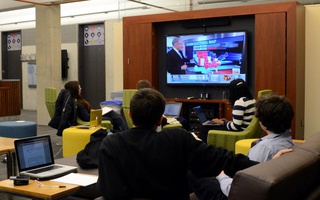In the next year, there is one question that will control your life. It is a part of your dreams, a part of your nightmares, a part of your every waking moment:
Why?
This is not the “Why?!?!” shouted in the heads of hundreds in dining halls across Harvard the night before a big exam, or the “Why?!” of the Winthrop resident who cannot walk through the back gate of Harvard’s most illustrious house. This “why” is the question that you’ve likely avoided for the better part of your college life, and the one that is worth agonizing over.
In order to fully engage in the work that you have set out to do next year, you will have to find the purpose behind your choices and the motivations for them. There are no ifs, ands, or buts about it.
So sit down. Grab a piece of paper and a pencil, or don’t. Write it down or think out loud. Why do you do the things you do? Why do you value the things that you do? Why, why, why?
This question was posed to me in my second month of teaching: “Mr. Acevedo, you went to Harvard, so you probably had other choices. No offense, you’re cool and all, but why are you here? This is East Los Angeles. ... I mean, you know.”
It was a loaded question that involved a history of perceived and real neglect. It was a question that made me cringe and made me want to hug that student. She said it because the vast majority of teachers from last year did not come back. She expressed feeling like she had been abandoned. I told her that I was there because I saw myself and my friends in each one of them. Her question led me to really examine what my motivations are for the work that I do.
My purpose is crafted from pieces of my parents’ experiences in the war-torn country of El Salvador in the 1980s, of an upbringing in one of the toughest neighborhoods in Los Angeles, and of the stark educational inequities that I experienced in public and private schools.
I get up in the mornings because, no matter how bad my night of work was, I have students who are struggling with shots fired in their housing developments, with mental health issues that their school isn’t nearly prepared enough to help them deal with, with families that struggle with substance abuse, and with living environments that sometimes excuse domestic abuse.
What’s your purpose? What gets you up in the morning? Why are you not doing something else? Why are you standing in the very spot that you are standing in right now?
Your reflection should not be divorced from action. The best part is this: You get to define what that means. When we reflect, we are reminded that we don’t have to be where we are now. We are not slaves to our current conditions. If you chose to be somewhere, you chose it for a reason. Make that reason matter like your soul depends on it. It does.
Adan Acevedo ’13 is a teacher at PUC Excel Charter Academy and a 2013 Teach for America Corps Member. He is the former president of the Harvard College Democrats and former co-president of Concilio Latino.
Read more in Opinion
Please Calculate BadlyRecommended Articles
-
Pumping Iron with World-Class JocksSome colleges dominate a sport for so long that the names become synonymous: like UCLA and basketball, and Alabama and
-
Americans See Voting as Solution to 'Leadership Crisis,' Says PollAs Election Day approaches, two-thirds of Americans feel that voting is the best way to rectify the nation’s current “leadership crisis,” according to a survey published by the Center for Public Leadership at Harvard Kennedy School and political consulting firm Merriman River Group.
-
 Students React to Election Results at IOP Watch Party
Students React to Election Results at IOP Watch Party -
 Barack Obama Reelected, Prompting Celebrations Across Campus
Barack Obama Reelected, Prompting Celebrations Across Campus -
 Top 5 Superbowl Commercials
Top 5 Superbowl Commercials -
 Parents of the Class of 2014 Descend on Cambridge
Parents of the Class of 2014 Descend on Cambridge













